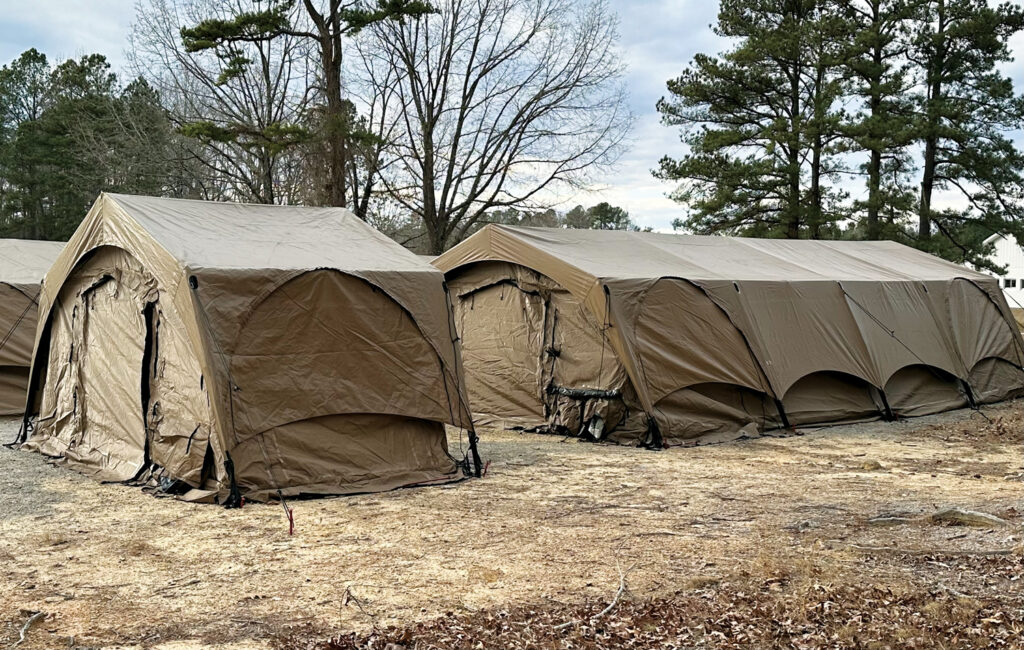
The U.S. Department of Defense (DOD) and other government agencies use many products made from specialty fabrics. They include military uniforms, straps, netting, tents and vehicle covers. High-quality fabrics are necessary so these products will be safe, perform well and have a long life. U.S. textile manufacturers lobby to keep as much of this business in the U.S. as possible.

Advocacy efforts
Members of the Advanced Textiles Association (ATA) and U.S. Industrial and Narrow Fabrics Institute (USINFI) work together to support Advocacy Days. USINFI members visit Capitol Hill to share industry concerns regarding regulatory, legislative, trade and policy issues affecting textile businesses with congressional representatives from their districts. Two participating members are Sue Uhler, senior sales engineer at Seaman Corp., a company founded by a U.S. veteran, and Michael M. Woody, CEO of Trans-Tex LLC. Sometimes USINFI’s advocacy representatives also interact with DOD staff to discuss regulatory requirements. “Over the years we have worked with the Defense Logistics Agency [DLA] and customers to support updating DOD specifications and materials to provide the best products for their applications,” Uhler says. She has been involved in various efforts in these areas over the last 20 years.
One main goal of USINFI’s lobbying is to keep in place specific legislation supporting preferences for government entities to buy American-made fabrics (see sidebar) and to protect U.S. manufacturers’ interests. Because of these laws, the DOD has ready access to materials in case of war or disaster. “Strict adherence to the Berry Amendment protects and strengthens our U.S. manufacturing base, which protects and creates jobs,” Woody points out. “It also ensures that our troops receive the highest-quality products and that the supply chain is secure from overseas disruption.” Should the amendment be weakened, foreign manufacturers that produce low-cost, lower-quality products would gain the opportunity to win business from the U.S. military.
Why is it critical to maintain domestic supply chains for U.S. troops? Woody reminds people “to think back to what happened in 2020 when the pandemic struck and our hospitals were unable to procure sufficient quality masks and disposable surgical gowns. As a country we want our troops to have the best gear and uniforms and a secure domestic supply chain.” He has been attending the Advocacy Days meetings in D.C. for about a decade.
“I remember during one war [the Iraq war], the DOD ‘demanded’ that we run a specific product for them,” recalls Uhler. “Seaman dedicated coating line time to keep our customers who supplied the DOD in stock.
“If these laws were to go away, our soldiers and/or country will have to rely strictly on offshore material supplied from China, Europe and other countries, as it would greatly inhibit the ability for U.S. companies to compete,” Uhler adds. “We need a robust industrial supply base in the U.S. to be self-sufficient. In addition, it would be more difficult to control the quality, quantity or shipping if DOD purchased offshore.”
Even though Woody’s business doesn’t sell directly to the military, many of its suppliers of the narrow web fabric on which it prints are heavily involved. “If those companies were to lose the military business, it might put them out of business,” he says. Because Trans-Tex relies on domestic sources, failure of these suppliers would also endanger his business.
Some difficult issues
“PFAS [per- and polyfluoroalkyl substances] is an important topic,” notes Uhler. “We have asked Congress to take a scientific approach to legislation on this issue.” While there is still work to be done in terms of personal protection for troops and first responders, the U.S. textiles industry has made progress in removing and/or replacing detrimental PFAS that could contaminate the environment.
“One of our biggest wins was moving the simplified acquisition threshold [SAT] back down to $250,000,” recalls Woody, referencing the amount of supplies or services that a government agency can purchase without going through a more formal, competitive approval process. “It had been pushed up to $500,000 several years back. The higher the SAT, the bigger the loophole for manufacturers from China and other countries that might present a strategic threat.”
But the SAT is still an industry concern, as some solicitations can be broken down to fall below the $250,000 SAT minimum. This could allow for an awarding of contracts to offshore or subpar suppliers. “This is critical when a war comes along or supply becomes tight and there may not be a U.S. supplier available to supply them,” Uhler notes.
Issues change over time
The industry must be alert to keep up with laws affecting the military and government contracts as they change. What will be promoted in advocacy efforts now and in the future will depend on the most recent version of the National Defense Authorization Act (NDAA). “Each year, the language of the NDAA must be carefully combed through to ensure that policies are not weakened to a point that would open the door for overseas manufacturers to undercut the U.S. manufacturing base and potentially disrupt the supply chain to our troops,” Woody cautions.
Unanticipated events, like the pandemic, which exposed U.S. supply chain weaknesses, will also affect the military’s needs for textiles. “The [personal protective equipment] issue during the recent pandemic is an example of critical goods being produced offshore,” Uhler notes. “U.S. manufacturers stepped up to fill the void. This should have been a warning sign to the U.S. to bring critical components back to the states and continue to work to be self-supporting. The textile industry must continue to work with our congressional delegates to ensure that U.S. industries are prioritized and supported to provide goods and services to the DOD and other governmental entities.”
Jean Feingold is a Gainesville, Fla.-based freelance writer.
SIDEBAR: Laws related to military purchases of fabric
Congress considers it so important for the Department of Defense (DOD) and the Department of Homeland Security to have constant access to the fabrics they need to do their jobs that it has passed three laws mandating that fabrics be purchased only from U.S. sources.
Berry Amendment: Requires DOD to buy certain goods, including textiles, footwear and other equipment items made from fabric, only from U.S. sources. The amendment is critical to maintaining the safety and security of U.S. armed forces and to the viability of the U.S. textile and clothing production base.
Buy American Act: Requires all U.S. government agencies to prefer American-made goods. Originally passed in 1933, it can be waived only if the domestic product costs 25% more than an identical foreign-sourced product, if there is not a sufficient quantity or quality of the product available domestically, or if the waiver is in the public interest.
Kissell Amendment: Requires the Department of Homeland Security to buy textiles from domestic sources when spending Homeland Security funds. Enacted in 2009, the law really applies only to the Transportation Security Administration because of prior U.S. commitments under the World Trade Organization Agreement on Government Procurement and other free-trade agreements opening U.S. government procurement to imported goods. The Kissell Amendment is in effect only where it does not contravene those commitments.
SIDEBAR: 2024 Advocacy Days topics
- Keeping the Berry Amendment strong as a part of the Fiscal Year 2025 National Defense Authorization Act
- Following a science-based process to regulate PFAS chemicals rather than banning all of them outright
- Supporting fixes to trade and tariff issues
 TEXTILES.ORG
TEXTILES.ORG


